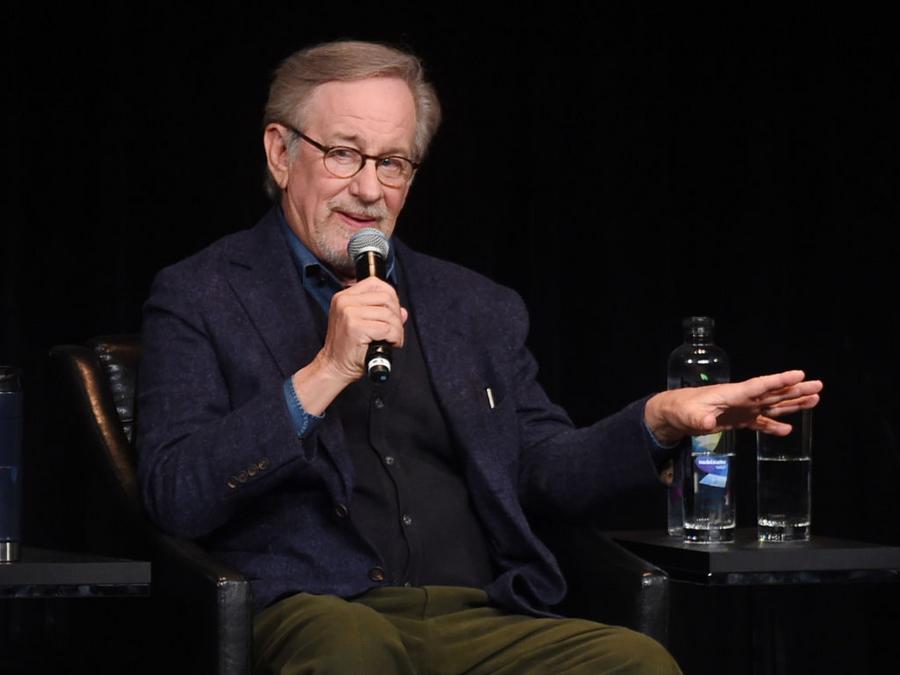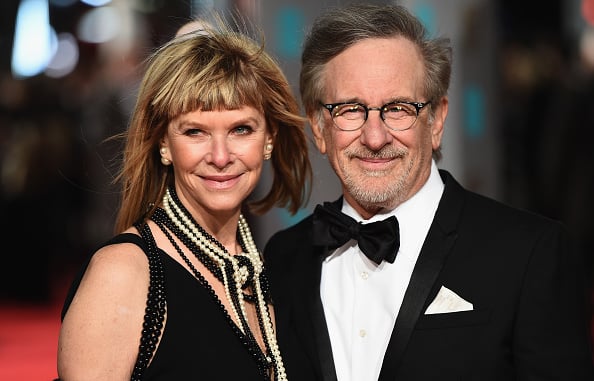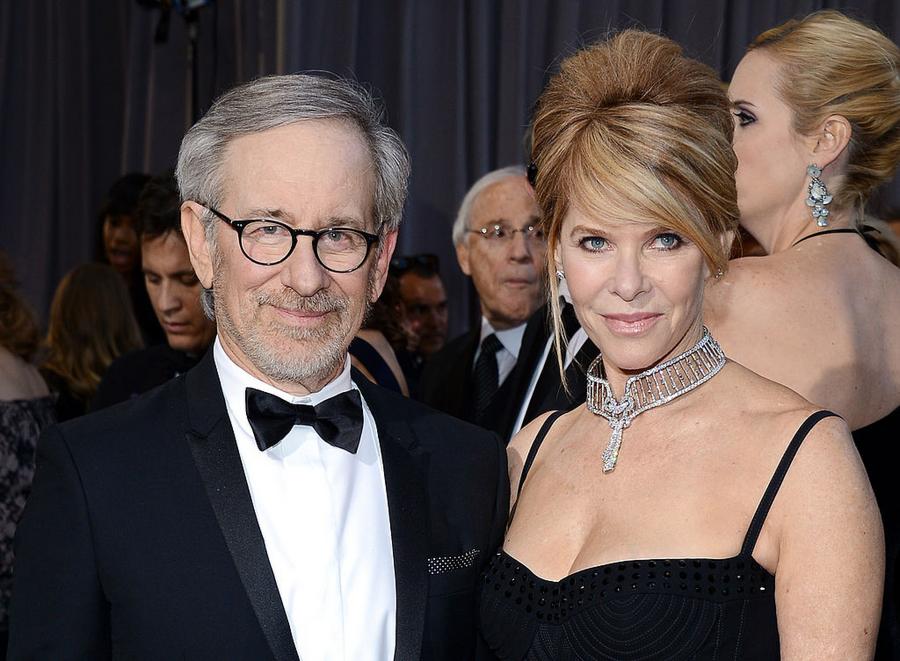What Is Steven Spielberg's Net Worth?
Steven Spielberg is an American director, screenwriter, and producer who has a net worth of $10 billion. Steven Spielberg's net worth makes him the second richest celebrity on the planet, just ahead of good buddy and fellow director/producer George Lucas' net worth, and just below actress (turned private equity wife and philanthropist), Jami Gertz.
Steven Spielberg is one of the most influential filmmakers in history, known for shaping modern cinema and redefining the Hollywood blockbuster. His career began with short films and television in the late 1960s, but his breakthrough came in 1975 with the release of "Jaws." The film was a massive commercial and critical success, pioneering the summer blockbuster model and launching Spielberg into the spotlight.
He followed "Jaws" with a string of iconic hits, including "Close Encounters of the Third Kind," "Raiders of the Lost Ark," and "E.T. the Extra-Terrestrial," each of which showcased his talent for combining awe-inspiring spectacle with emotional storytelling. Spielberg co-created the "Indiana Jones" franchise with George Lucas and directed several installments, helping solidify Harrison Ford's status as a leading man.
Throughout the 1980s and 1990s, Spielberg displayed a remarkable ability to move between genres. He directed the harrowing Holocaust drama "Schindler's List," which won him the Academy Award for Best Director, as well as the intense World War II epic "Saving Private Ryan," which also earned him Best Director. He continued to explore serious themes in films like "Amistad," "Munich," and "Lincoln," while also returning to popular entertainment with titles like "Jurassic Park," "Catch Me If You Can," and "Minority Report."
In addition to directing, Spielberg has had a major impact as a producer. Through Amblin Entertainment and later DreamWorks, he helped bring to life hits like "Back to the Future," "Who Framed Roger Rabbit," "The Goonies," and many others. His films have collectively grossed over $10.6 billion at the global box office, more than any other director in history.
Spielberg has received numerous awards throughout his career, including multiple Oscars, Golden Globes, and the Presidential Medal of Freedom.
Earnings and Salary
For his own films, Steven frequently opts for a relatively low upfront salary, $10 million, in exchange for backend points on the gross revenue. One such deal for 1993's "Jurassic Park" resulted in a $250 million payday for Steven. That's the same as roughly $360 million in today's dollars. He earned at least $150 million from the sequel and $75 million from the third installment, which he did not even direct.
He famously refused to accept a salary for "Schindler's List," calling any money earned "blood money." He instead directed all proceeds owed to him in perpetuity to be used to fund the USC Shoah Foundation in 1994, which honors and remembers Holocaust survivors.

Jamie McCarthy/Getty Images
Universal Parks/Comcast Deal
In 1987, Steven Spielberg signed what would become one of the most lucrative entertainment contracts of all time. At the time, Universal's parent company MCA was preparing to launch its first full-scale theme park in Orlando. Spielberg had already delivered blockbuster hits like "Jaws" and "E.T.," and Warner Bros. was aggressively trying to lure him away. Unable to match Warner's cash offer, MCA president Sid Sheinberg came up with a creative solution.
Spielberg agreed to stay with Universal in exchange for a consulting role on theme park attractions based on his films. In return, he was granted 2% of gross ticket sales—not profits, but top-line revenue—from Universal Studios Florida. He also received a cut of concession revenue. Most significantly, the deal was signed in perpetuity. When the park opened in 1990, Spielberg began earning a percentage from every single ticket sold.
Over time, the deal expanded to include new Universal parks in Japan, Singapore, and Beijing. Universal Studios Hollywood was not included, but most international locations were. For nearly four decades, Spielberg has collected tens of millions of dollars annually from the parks, regardless of whether he's involved in new rides or attractions.
The arrangement remained a closely guarded secret until 2009, when a financial disclosure revealed Spielberg had been earning roughly $30 million per year from what were labeled "consulting fees." That same disclosure revealed a buyout clause: beginning in 2010, Spielberg had the right to demand a one-time lump-sum payment equal to the projected lifetime value of his royalties. At the time, the buyout amount was estimated at $300–500 million.
Universal, which was carrying over $1 billion in debt, was desperate to avoid triggering the clause. Spielberg initially ignored their outreach, then ultimately agreed to delay his buyout option to 2017. In exchange, he expanded his royalty rights to cover all new parks under development and secured a clause guaranteeing his payments would continue even if Universal changed ownership.
In 2011, Comcast acquired NBCUniversal and inherited the deal. By 2017, Spielberg's annual payouts had reportedly grown to $50 million, pushing the potential buyout cost to $1–2 billion. He declined to exercise the option and instead continued collecting royalties.
Today, a tickey to a Universal Studios theme park costs around $119. That means Spielberg earns around $2.38 for every ticket sold at participating Universal theme parks. With an estimated 25 million tickets sold annually, that translates to $60–70 million per year, not including concessions.
"Star Wars" Bet
Back in the late 1970s, during the production of what would become "Star Wars," writer/director/creator George Lucas was convinced that his passion project would be an enormous bomb. At the same time, Spielberg was filming what would become "Close Encounters of the Third Kind." In a moment of particular weakness and desperation, Lucas asked Spielberg if he would trade backend points on their respective films. As Spielberg would later recount:
"He said, 'You want to trade some points? I'll give you two and a half percent of 'Star Wars' if you give me two and a half percent of 'Close Encounters.' I said, 'Sure, I'll gamble with that, great.'"
Spielberg accepted. And while "Close Encounters" was a big hit, earning more than $300 million globally, "Star Wars" would eventually go on to earn billions. In the process, Steven made (and still makes to this day) a small fortune from a movie he had nothing to do with at all.

Frederick M. Brown/Getty Images
Early Life
Spielberg had humble beginnings when he was just a boy with a huge imagination and a dream. Steven Spielberg was born on December 18th, 1946, in Cincinnati, Ohio. His mother, Leah Adherer, was a concert pianist, and his father, Arnold Spielberg, was an electrical engineer involved in the development of computers. Steven's childhood was spent in Haddon Heights, New Jersey, and Scottsdale, Arizona. It was in Scottsdale, as a teenager, that a young Spielberg would create 8mm short films.
At age 12, he made his first movie when he filmed a train wreck involving his toy Lionel trains. Even back then, Spielberg had the gall to charge 25 cents for the local kids to come and watch his many epics. At the age of 13, Spielberg won an award for his 40-minute film about war called "Escape to Nowhere." At the age of sixteen, he made his first feature-length film, "Firelight," which he played at his local cinema. It was a sci-fi film that would later go on to inspire the classic "Close Encounters of the Third Kind". Unfortunately, his parents eventually divorced, and he moved with his father to Saratoga, California, where Steven attended and graduated from Saratoga High School.
After graduation, he applied to the University of Southern California School of Theater, Film, and Television but was rejected three times. Instead, he attended California State University, Long Beach, where he became part of the Theta Chi Fraternity.
Early Career
His career did not begin until he worked at Universal Studios as an unpaid intern for the editing department. It was during this time that Spielberg directed a twenty-four-minute short film, "Amblin" (a name that he would eventually carry to his production company), which caught the eye of Sidney Shainberg, who was the vice president of production for Universal's television division. Spielberg became the youngest director to ever sign a long-term contract with a major studio. He dropped out of college for the opportunity (but later returned in 2002 to complete his BA degree in Film and Electronic Arts, as if he needed the credentials to back up the field experience!)
During his time as a television director, he directed episodes of Rod Sterling's "Night Gallery," "Columbo," and "Marcus Welby, M.D." These ventures were so successful that he was signed on to shoot four made-for-television films. The first of which was the 1971 classic "Duel." "Duel" was such a success that he was offered the job of directing the theatrical feature film "The Sugarland Express." The film was met with a lot of positive feedback.
Success
It was not until 1975 that Spielberg's career skyrocketed with the success of "Jaws." In 1975, "Jaws" became the first real blockbuster film after over 67% of Americans went to see it. At that time, he rejected offers to make "Jaws 2," "King Kong," and "Superman." Instead, Steven followed "Jaws" up with "Close Encounters of the Third Kind" starring Richard Dreyfus (whom Spielberg considers his alter ego). In 1981, he teamed up with long-time friend and fellow filmmaker George Lucas to create "Raiders of the Lost Ark," the first installment in the "Indiana Jones" series, which was an even bigger hit.
A year later, Spielberg went back to the science-fiction genre when he directed "E.T., the Extra-Terrestrial," a film about a young boy and the friendly alien he befriends. "E.T." went on to become the top-grossing film of all time and was nominated for nine Oscars. Between 1982 and 1985, Spielberg produced three incredibly high-grossing and acclaimed films: "Poltergeist" (he also co-wrote the screenplay), "The Twilight Zone," and "The Goonies" (he also wrote the screenplay and executive produced the film).
Next up, Spielberg directed the "Raiders" prequel, "Indiana Jones and the Temple of Doom," again teaming up with George Lucas and Harrison Ford. This movie, along with the Spielberg-produced "Gremlins," led to the creation of the PG-13 rating. The movie was a huge 1984 blockbuster. The following year saw Spielberg's release of an adaptation of Alice Walker's Pulitzer Prize-winning novel "The Color Purple," starring Whoopi Goldberg and Oprah Winfrey. The film helped catapult Spielberg into the dramatic genre, with Roger Ebert announcing it as the best film of the year and later entering it into his Great Films archive. The movie was nominated for eleven Oscars. In 1987, Spielberg shot Empire of the Sun, the first American film in Shanghai since the 1930s. While it didn't garner substantial box office wins, it was critically acclaimed and nominated for several Academy Awards.
After two forays into more serious dramatic films, Spielberg then directed the third "Indiana Jones" film, 1989's "Indiana Jones and the Last Crusade."
Steven's career would continue to create more massive hits such as 1991's "Hook," starring Robin Williams, "AI Artificial Intelligence," "Minority Report," and "Jurassic Park," a legendary film that needs no introduction or explanation. He also executive-produced the entire "Men in Black" franchise. He continued his dramatic work throughout the 2010s with movies like "War Horse," "Bridge of Spies," "Lincoln," "The Post," and "Ready Player One." In 2021, he directed and co-produced "West Side Story," and in 2022, Spielberg's "The Fabelmans" film was released.
In addition to the box office acclaim, he has also seen critical acclaim and awards. Spielberg has won three Academy Awards, two of them for directing (1993's "Schindler's List" and 1998's "Saving Private Ryan," both of which are consistently found on lists of the greatest films of all time) and one for Best Picture ("Schindler's List"). His films are consistently nominated for Best Picture and Best Director.
Apart from his extensive and genius film career, Spielberg has long been involved in video game production: collaborating, directing, designing, and screenwriting.
Steven Spielberg continues to make, direct, produce, and breathe films.

Getty
Personal Life
In 1985, Spielberg and his first wife, actress Amy Irving, welcomed son Max Samuel Spielberg. The couple divorced in 1989 after three and a half years of marriage. They cited the competing stresses of their careers as a main cause of their falling out. Their divorce was reportedly the third most costly celebrity divorce in history at that time.
He got remarried on October 12, 1991, to actress Kate Capshaw, whom he had met when she was cast in "Indiana Jones and the Temple of Doom." Capshaw converted to Spielberg's religion, Judaism. The couple has five children together: Sasha, Sawyer, Destry, and two adopted children, Theo and Mikaela. Steven also has a stepdaughter, Jessica.
Spielberg's daughter, Sasha, is an actress and musician and goes by the stage name Buzzy Lee.

Getty
Real Estate
Steven and Kate own at least $200 million worth of real estate around the world.
For many years, they owned a 1.4-acre slice of Malibu's most-coveted beachfront. They bought the first of the parcels that became their final property back in 1989 for $3.375 million. They expanded their footprint in 2002, purchasing the lot next door for $3.2 million. They sold the property, which has 150 feet of ocean frontage, in 2015 for $26 million.
Their longtime primary residence, which they still own today, is an incredible 5-acre multi-home compound in the Pacific Palisades overlooking the Pacific Ocean. He bought the enormous Pacific Palisades estate in 1985 from singer/songwriter Bobby Vinton. Steven was especially excited to buy the property after learning that it had previously been owned by a number of classic celebrities, including Cary Grant and Barbara Hutton. David Selznick lived on the property while he was producing "Gone With the Wind," a fact Spielberg loves. His Palisades home has a Hobbit-themed room with a retractable TV and a hobbit-like fireplace. In his biography, Spielberg explained: "Hobbits were part of my personal mythology growing up," he stated. "I wanted to have the TV room, where I spend most of my life, to have a Hobbit feel." In 2013, he added a vineyard to the property. Due to its size and uniqueness, it's very difficult to estimate the value of the Spielberg Palisades home today. It is easily worth north of $100 million. Perhaps $150-250 million.
Not far from their Palisades home, the Spielbergs own an equestrian facility.
On the East Coast, they own a 6,000-square-foot New York City apartment that directly overlooks Central Park West. The Spielberg apartment is located in the San Remo building, a luxury 27-floor co-op building located between West 74th Street and West 75th Street. The building has long been a favorite of celebrities. In 1982, Steve Jobs bought an apartment occupying the top two floors of the North Tower. Jobs spent years renovating the apartment but never lived in it. Instead, he sold the renovated apartment to Bono in 2003 for $14 million. Other famous residents have included Diane Keaton, Tiger Woods, Steve Martin, Bruce Willis, Demi Moore, Donna Karan, Mary Tyler Moore, and many more. As a co-op, The San Remo has to accept residents before they are allowed to buy into the building. One person the co-op board famously declined is Madonna. She wanted to move into The San Remo in 1985 and was denied.
Out in East Hampton, they own a 10-acre estate that is partially oceanfront and partially on a cove. The Spielberg compound encompasses 7.5 acres. In 2013, a nearby 5.5-acre property was put on the market for $75 million by a woman named Courtney Ross. Courtney is the widow of Steve Ross, the one-time Chairman of Warner Communications and longtime mentor of Steven. Spielberg would later describe Ross as "very much what I wish my father was." "Schindler's List" is dedicated to Steve Ross.
Courtney sold her property for $50 million after a year on the market, perhaps not coincidentally, to Spielberg's Dreamworks co-founder David Geffen. Geffen sold the estate two years later for $67 million. Again, the Spielberg-Capshaw property is at least two acres larger than the former Ross/Geffen property.
The Spielbergs also have a large mansion in Naples, Florida. Not a lot of information is available about this property except that it is in a very exclusive part of Old Naples. Apparently, there are a lot of rumors in Naples about Spielberg's home. One local realtor said, "If Steven Spielberg bought all the houses I've heard he's bought here, he would own 62 homes. It's just absurd."
Steven has also financed several homes for his children around Los Angeles.

Michael Buckner/Getty Images
Yacht & Hobbies
Spielberg is an avid boating enthusiast. In 2013, he paid $182 million for a mega-yacht (282 feet) called the Seven Seas. He later put it up for sale and upgraded to a new 300-foot yacht that cost him a whopping $250 million.
He's also a collector of old film memorabilia. He owns brag-worthy trinkets like a balsa Rosebud Sled from the set of "Citizen Kane" and Orson Welles's own directorial copy of the script for 1938's "The War of the Worlds." He purchases Academy Award statuettes (for example, the awards that Bette Davis won in the 1930s) being sold on the open market and donates them to the Academy of Motion Picture Arts and Sciences in order to keep them preserved and prevent commercial exploitation. Spielberg also owns many works by American painter Norman Rockwell. His own personal collection of 57 Rockwell paintings (along with fellow collector George Lucas's own works) was displayed at the Smithsonian in an exhibition titled "Telling Stories" in 2011.
Although we can't imagine where he finds the time, Spielberg is also a film buff who watches several films on any given weekend.
/2009/09/GettyImages-462964902.jpg)
/2009/09/George-Lucas-2.jpg)
/2020/10/kath.jpg)
/2023/02/john-williams.jpg)
/2011/01/GettyImages-107985635.jpg)
/2014/03/Steven-Spielberg.jpg)
/2010/10/GettyImages-468741788.jpg)
/2010/07/John-Elway.jpg)
/2020/04/Teddy-Bridgewater.jpg)
/2021/10/Tea-Leoni.jpg)
/2021/05/Ian-Ziering.jpg)
/2013/09/reggie.jpg)
/2014/11/Odell-Beckham-Jr.jpg)
/2022/08/mickey.jpg)
/2019/11/Jerry-Jones-1.jpg)
/2009/11/seal2.jpg)
/2010/11/Tyson-Beckford.jpg)
/2009/09/GettyImages-462964902.jpg)
/2014/03/Steven-Spielberg.jpg)
/2017/07/spielberg.jpg)
/2015/07/thumb-1.jpg)
/2021/05/2021-05-22.jpg)
/2019/05/george-steven.jpg)
/2016/10/GettyImages-585562740.jpg)
/2019/11/GettyImages-1141834887.jpg)